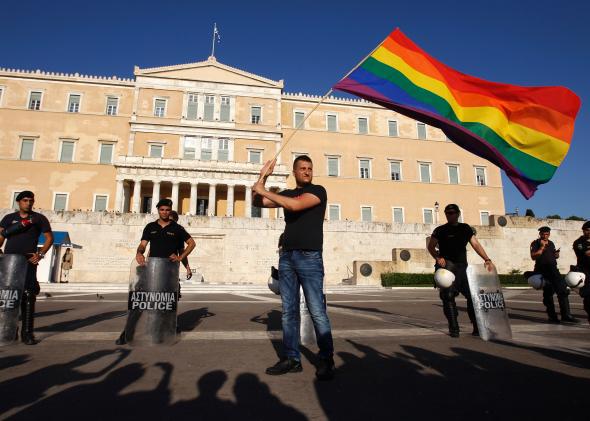Ever since Syriza was swept to power on a wave of anti-establishment feeling in January, interest has, understandably, focused on what the party’s victory means for Greece’s external politics. Just as radical, however, is what Syriza can do to change the country’s internal dynamics, including for Greece’s LGBTQ minority, whose character has changed tremendously since 2008, though it is still a marginalized group within the general society.
The European debt crisis undermined the role of political parties and traditional institutions in Greece. One reaction to this loss of trust has been the emergence of a new civil society, with volunteerism, bartering for goods and services, and neighborhood community organizing filling the gaps left by the government’s retraction. Another emerging trend is one of civil activism, which is where the LBGTQ community comes in.
Before 2010, the only LGBTQ organizations with legal status as registered NGOs were Athens Pride and OLKE, the Gay and Lesbian Community of Greece. The former was responsible for organizing the annual Pride festival; the latter handled everything else, including legal and advocacy work. The work was done by “a small community of older activists; they didn’t recognize that community-building is a goal in and of itself,” Penelope Kaouni, an activist with OLKE and Colour Youth, explained when we met for coffee in the Monastiraki district of Athens.
Part of the emergence of civil initiatives was the proliferation of a new generation of LGBTQ groups. The first of these was Colour Youth, formed in Athens as an organization for young LGBTQ Greeks in the autumn of 2010 and gaining status as an NGO in January 2012. “Colour Youth started as a small group, initially formed out of people who had been volunteers at Athens Pride, but what they could not find was some sort of structure that would be around throughout the year,” Kaouni explained.
“The reason this signified a change was the age of the people involved in the movement, because the existing organizations were there to serve the needs of those who were around before those organizations were created,” namely, the older generation of activists. After Colour Youth, organizations for young LGBTQ people were founded in the cities of Thessaloniki and Patras. Today, there are at least six groups serving sexual minority youth across the country.
This new network of organizations aimed specifically at young people has changed the nature of LGBTQ activism in Greece. It has led to increased visibility, especially for people based outside Athens and for trans people, who were not fully represented before 2010. At that time, “the attitude was that if you are a proper LGBT person, you won’t make a fuss. You’ll carry on with your life and not make a big deal out of your lack of equality,” Kaouni said. These new groups are directly lobbying left-wing parties in particular. LGBTQ issues are no longer invisible.
Increased visibility has placed LGBTQ rights on the political agenda. During the last parliament, after much debate, sexual orientation and gender identity were eventually included in the definition of hate crimes. But it has also meant violence. “The previous government was mostly indifferent to human rights in general, so its record on LGBT rights was accordingly pretty bad. I think its worst failure was the rise in homophobic violence,” Vasiliki Katrivanou, a Syriza member of the Greek parliament since June 2012 whose work focuses on human rights, told me via email.
Katrivanou cited statistics provided by the Racist Violence Recording Network, which showed that “there were at least 28 homophobic assaults in 2013, LGBT individuals being the second largest target group of racist attacks, after immigrants.” This violence can be linked to the increased social presence of far-right factions, such as Golden Dawn, and homophobic rhetoric in the Greek Parliament. “At times it felt relentless, to have to listen to members of parliament say that you are a threat against the nation and a product of capitalism. It was a violent time,” Kaouni said.
Syriza’s victory in January offers, at the very least, a possibility of progress on LGBTQ rights in Greece. The new government has already announced that it intends to open up civil partnerships to same-sex couples. “I think that cohabitation agreement and gay marriage are the most critical issues right now. Homosexual couples are currently not recognized officially, and this deprives partners of hereditary and insurance rights,” Katrivanou told me.
“There are of course other issues, like LGBT adoption, or the right of transgender people to change their legal identification, and we will have to see to them, too. We have to fight homophobia and transphobia in schools, in police, in justice, in the public sector, in society in general,” she concluded.
The LGBTQ community’s enthusiasm has been tempered by Syriza’s decision to enter into coalition with ANEL, a right-wing populist faction whose agenda on minority issues is in essence the mirror image of Syriza’s. I asked Katrivanou if Syriza’s claim to be the party of minority rights was undermined by its alliance with ANEL. She said recent government announcements should allay such fears. “Syriza will not retreat as far as basic human rights are concerned. This is guaranteed both by its strong force in the new Parliament and by the sincere relationships it has developed over the years with human rights advocate groups and communities,” she said.
“There is some anxiety, but we do know that this is a lot better than the previous government,” Kaouni told me. “For the first time, we get to have a government that is aware of our demands, what we consider our rights to be, and why it is wrong that we are unequal. After these elections, there is hope we can achieve a lot more.”
